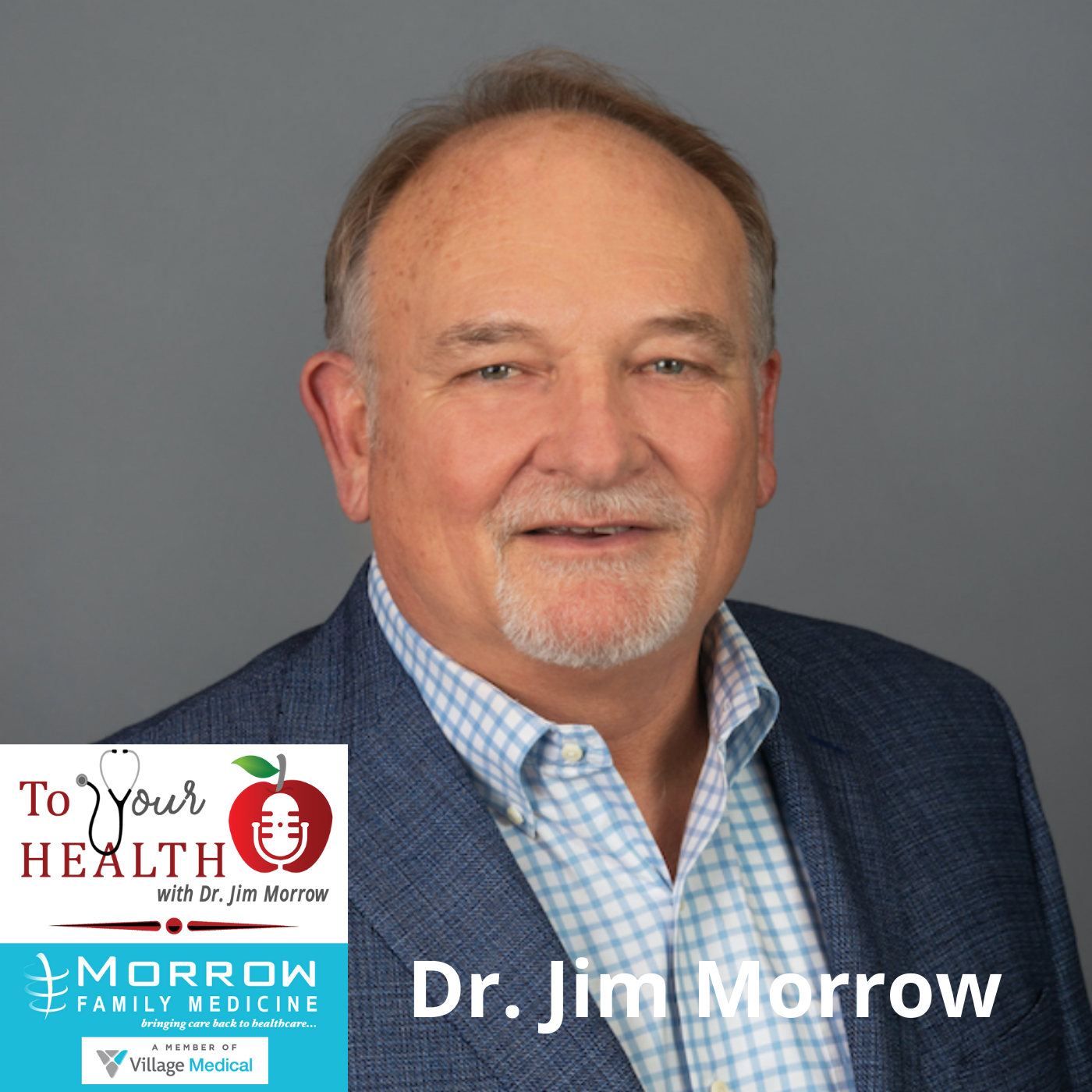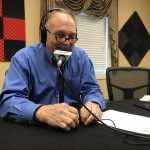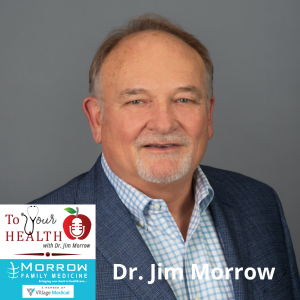
Atrial Fibrillation (Episode 69, To Your Health with Dr. Jim Morrow)
Recalling his wife’s transient ischemic attack (TIA) several months ago in the middle of the night, Dr. Jim Morrow says the ultimate diagnosis was Atrial Fibrillation. Dr. Morrow describes the symptoms, but notes that some people do not experience symptoms and sometimes have events, such as a TIA, which point to atrial fibrillation. Because of the risk of blood clots, he stresses the need to check all symptoms that may arise without delay, discusses treatments, and much more. To Your Health is brought to you by Morrow Family Medicine, a Member of Village Medical, which brings the care back to healthcare.
About Morrow Family Medicine, A Member of Village Medical
Morrow Family Medicine, a Member of Village Medical, is an award-winning, state-of-the-art family practice with offices in Cumming and Milton, Georgia. The practice combines healthcare information technology with old-fashioned care to provide the type of care that many are in search of today. Two physicians, three physician assistants and two nurse practitioners are supported by a knowledgeable and friendly staff to make your visit to Morrow Family Medicine, A Member of Village Medical one that will remind you of the way healthcare should be. At Morrow Family Medicine, a Member of Village Medical, we like to say we are “bringing the care back to healthcare!” The practice has been named the “Best of Forsyth” in Family Medicine in all five years of the award, is a three-time consecutive winner of the “Best of North Atlanta” by readers of Appen Media, and the 2019 winner of “Best of Life” in North Fulton County.
Village Medical offers a comprehensive suite of primary care services including preventative care, treatment for illness and injury, and management of chronic conditions such as diabetes, congestive heart failure, chronic obstructive pulmonary disease (COPD) and kidney disease. Atlanta-area patients can learn more about the practice here.
Dr. Jim Morrow, Morrow Family Medicine, and Host of To Your Health with Dr. Jim Morrow
 Dr. Jim Morrow is the founder and CEO of Morrow Family Medicine. He has been a trailblazer and evangelist in healthcare information technology, was named Physician IT Leader of the Year by HIMSS, a HIMSS Davies Award Winner, the Cumming-Forsyth Chamber of Commerce Steve Bloom Award Winner as Entrepreneur of the Year and he received a Phoenix Award as Community Leader of the Year from the Metro Atlanta Chamber of Commerce. He is married to Peggie Morrow and together they founded the Forsyth BYOT Benefit, a charity in Forsyth County to support students in need of technology and devices. They have two Goldendoodles, a gaggle of grandchildren and enjoy life on and around Lake Lanier.
Dr. Jim Morrow is the founder and CEO of Morrow Family Medicine. He has been a trailblazer and evangelist in healthcare information technology, was named Physician IT Leader of the Year by HIMSS, a HIMSS Davies Award Winner, the Cumming-Forsyth Chamber of Commerce Steve Bloom Award Winner as Entrepreneur of the Year and he received a Phoenix Award as Community Leader of the Year from the Metro Atlanta Chamber of Commerce. He is married to Peggie Morrow and together they founded the Forsyth BYOT Benefit, a charity in Forsyth County to support students in need of technology and devices. They have two Goldendoodles, a gaggle of grandchildren and enjoy life on and around Lake Lanier.
Facebook: https://www.facebook.com/MorrowFamMed/
LinkedIn: https://www.linkedin.com/company/7788088/admin/
Twitter: https://twitter.com/toyourhealthMD
The complete show archive of To Your Health with Dr. Jim Morrow addresses a wide range of health and wellness topics and can be found at www.toyourhealthradio.com.
Dr. Morrow’s Show Notes
Atrial Fibrillation
- Atrial fibrillation (A-fib) is an irregular and often very rapid heart rhythm (arrhythmia) that can lead to blood clots in the heart.
- A-fib increases the risk of stroke, heart failure and other heart-related complications.
- During atrial fibrillation, the heart’s upper chambers (the atria) beat chaotically and irregularly —
- out of sync with the lower chambers (the ventricles) of the heart.
- For many people, A-fib may have no symptoms.
- However, A-fib may cause a fast, pounding heartbeat (palpitations), shortness of breath or weakness.
- Episodes of atrial fibrillation may come and go, or they may be persistent.
- Although A-fib itself usually isn’t life-threatening, it’s a serious medical condition that requires proper treatment to prevent stroke.
- Treatment for atrial fibrillation may include medications, therapy to reset the heart rhythm and catheter procedures to block faulty heart signals.
- A person with atrial fibrillation may also have a related heart rhythm problem called atrial flutter.
- Although atrial flutter is a different arrhythmia, the treatment is quite similar to atrial fibrillation.
Symptoms
- Some people with atrial fibrillation (A-fib) don’t notice any symptoms. Those who do have atrial fibrillation symptoms may have signs and symptoms such as:
- Sensations of a fast, fluttering or pounding heartbeat (palpitations)
- Chest pain
- Dizziness
- Fatigue
- Lightheadedness
- Reduced ability to exercise
- Shortness of breath
- Weakness
- Atrial fibrillation may be:
- Occasional (paroxysmal atrial fibrillation).
- A-fib symptoms come and go,
- usually lasting for a few minutes to hours.
- Sometimes symptoms occur for as long as a week and episodes can happen repeatedly.
- Symptoms might go away on their own. Some people with occasional A-fib need treatment.
- A-fib symptoms come and go,
- Persistent.
- With this type of atrial fibrillation, the heart rhythm doesn’t go back to normal on its own.
- If a person has A-fib symptoms, cardioversion or treatment with medications may be used to restore and maintain a normal heart rhythm.
- With this type of atrial fibrillation, the heart rhythm doesn’t go back to normal on its own.
- Long-standing persistent.
- This type of atrial fibrillation is continuous and lasts longer than 12 months.
- Permanent.
- In this type of atrial fibrillation, the irregular heart rhythm can’t be restored.
- Medications are needed to control the heart rate and to prevent blood clots.
- In this type of atrial fibrillation, the irregular heart rhythm can’t be restored.
- Occasional (paroxysmal atrial fibrillation).
When to see a doctor
- If you have any signs or symptoms of atrial fibrillation, make an appointment with your doctor.
- If you have chest pain, seek immediate medical help.
- Chest pain could mean that you’re having a heart attack.
Causes
- To understand the causes of A-fib, it may be helpful to know how the heart typically beats.
- The typical heart has four chambers —
- two upper chambers (atria) and two lower chambers (ventricles).
- Within the upper right chamber of the heart (right atrium) is a group of cells called the sinus node.
- The sinus node is the heart’s natural pacemaker.
- It produces the signal that starts each heartbeat.
- In a regular heart rhythm:
- The signal travels from the sinus node through the two upper heart chambers (atria).
- The signal passes through a pathway between the upper and lower chambers called the atrioventricular (AV) node.
- The movement of the signal causes your heart to squeeze (contract), sending blood to your heart and body.
- In atrial fibrillation,
- the signals in the upper chambers of the heart are chaotic.
- As a result, the upper chambers shake (quiver).
- The AV node is then bombarded with signals trying to get through to the lower heart chambers (ventricles).
- This causes a fast and irregular heart rhythm.
- The heart rate in atrial fibrillation may range from 100 to 175 beats a minute.
- The normal range for a heart rate is 60 to 100 beats a minute.
- the signals in the upper chambers of the heart are chaotic.
Causes of atrial fibrillation
- Problems with the heart’s structure are the most common cause of atrial fibrillation.
- Other possible causes of A-fib include:
- Coronary artery disease
- Heart attack
- Heart defect that you’re born with (congenital heart defect)
- Heart valve problems
- High blood pressure
- Lung diseases
- Physical stress due to surgery, pneumonia or other illnesses
- Previous heart surgery
- Problem with the heart’s natural pacemaker (sick sinus syndrome)
- Sleep apnea
- Thyroid disease such as an overactive thyroid (hyperthyroidism) and other metabolic imbalances
- Use of stimulants, including certain medications, caffeine, tobacco and alcohol
- Viral infections
- Some people who have A-fib have no known heart problems or heart damage.
Risk factors
- Things that can increase the risk of atrial fibrillation (A-fib) include:
- Age. The older a person is, the greater the risk of developing A-fib.
- Heart disease. Anyone with heart disease — such as heart valve problems, congenital heart disease, congestive heart failure, coronary artery disease, or a history of heart attack or heart surgery — has an increased risk of atrial fibrillation.
- High blood pressure. Having high blood pressure, especially if it’s not well controlled with lifestyle changes or medications, can increase the risk of atrial fibrillation.
- Thyroid disease. In some people, thyroid problems may trigger heart rhythm problems (arrhythmias), including atrial fibrillation.
- Other chronic health conditions. People with certain chronic conditions such as diabetes, metabolic syndrome, chronic kidney disease, lung disease or sleep apnea have an increased risk of atrial fibrillation.
- Drinking alcohol. For some people, drinking alcohol can trigger an episode of A-fib. Binge drinking further increases the risk.
- Obesity. People who have obesity are at higher risk of developing atrial fibrillation.
- Family history. An increased risk of atrial fibrillation occurs in some families.
Complications
- Blood clots are a dangerous complication that can lead to stroke.
- In atrial fibrillation, the chaotic heart rhythm can cause blood to collect in the heart’s upper chambers (atria) and form clots.
- If a blood clot in the left upper chamber (left atrium) breaks free from the heart area, it can travel to the brain and cause a stroke.
- The risk of stroke from A-fib increases as you grow older. Other health conditions also may increase your risk of a stroke due to A-fib, including:
- In atrial fibrillation, the chaotic heart rhythm can cause blood to collect in the heart’s upper chambers (atria) and form clots.
- High blood pressure
- Diabetes
- Heart failure
- Some valvular heart disease
- Blood thinners are commonly prescribed to prevent blood clots and strokes in people with atrial fibrillation.
Prevention
- Healthy lifestyle choices can reduce the risk of heart disease and may prevent atrial fibrillation.
- Here are some basic heart-healthy tips:
- Eat a nutritious diet
- Get regular exercise and maintain a healthy weight
- Don’t smoke
- Avoid or limit alcohol and caffeine
- Manage stress, as intense stress and anger can cause heart rhythm problems















